It is highly significant for young aspirants to focus on gaining essential skills relevant to the demands of the 21st century. As far as career options go, there are plenty of lucrative ones, and Java remains one of them.
Java is one of the most popular programming languages used by companies across the globe. Startups, companies, and enterprises need to hire experienced Java Developers to build, manage, and maintain enterprise-level applications and software products.
Undoubtedly, developers specializing in Java are always in demand and paid handsomely. According to Indeed, average Java developers in the US earn as high as $101088 per year, while leading ones could make many times above that.
Learning Java is not too difficult for average learners. Many professional developers have learned Java by self-studying or taking online courses. I recommend the latter, as you can master the language much easier and faster if you learn from experienced instructors.
Currently, there are numerous Java courses available online. However, most of them are worth taking. Some courses are poorly created so that you may spend your money and valuable time to no avail.
I decided to do the heavy lifting for you. I have listed the best courses and training programs that I have found helpful in developing Java programming skills in this article. You can then choose the one that suits your preference and budget and start learning right away.
Affiliate Disclosure: This post from Victory Tale contains affiliate links. If you purchase Java courses through them, we will receive a small commission from its providers.
Nevertheless, we always value integrity and prioritize our audience’s interests. You can then rest assured that we will present each course truthfully.
Things You Should Know
Prerequisites
Java is one of the first programming languages taught in colleges. Therefore, you don’t need any background knowledge to take a beginner Java course.
In my opinion, Java is not the most straightforward programming language to learn, but with robust dedication, you will master the language in no time.
However, this post will also feature advanced Java courses. If you want to take those, you should have taken a previous Java course and understood core Java concepts thoroughly or at least have basic knowledge in any programming language (C++, Python, JavaScript, etc.).
Criteria
Below are my criteria for the best online courses to learn Java.
- Creditable instructor with years of experience in web or software development
- User-friendly learning platform
- Most of the course content has to be up-to-date.
- High-quality course materials
- Provide excellent value for money
- Mostly positive reviews from real students
- My personal experience with the course, instructor, or learning platform must be positive.
Best Courses to Learn Java for Beginners
We will start with beginner-level courses. Unless indicated otherwise, you can freely take any course without worrying about the prerequisites.
1. Java Programming Masterclass covering Java 11 & Java 17
With more than 600000 students, this Udemy course is unarguably one of the most popular online Java courses. You will learn from Tim Buchalka, a famous Java instructor with more than 40 years of experience in software development.
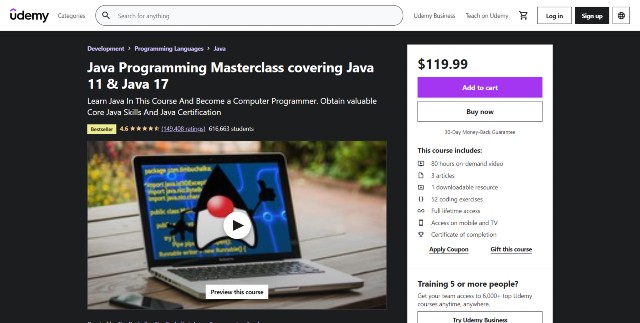
Course Content
This Java course is lengthy. Currently, it has more than 80 hours of video content. Below is a summary of what you will learn from the course.
- Set up two Java Development Environments (JDK 11 and IntelliJ IDEA)
- Primitive Types, Variables, Operators
- Expressions, Statements, Methods
- Control Flow Statements
- Deep dive into Object-Oriented Programming (OOP)
- Arrays, Java Inbuilt Lists, Autoboxing & Unboxing
- Java Generics, Java Collections, JavaFX
- Basic I/O
- Concurrency, Lambda Expressions, Regular Expressions
- Debugging and Unit Testing
- SQLite Database
- and many more
Overall, this course aims to equip you with all the skills you need to get hired as a Java developer. You can even use it to prepare for Oracle’s Java certification exam. Hence, if you want a one-stop shop to learn Java, this one is unarguably worth your consideration.
The only drawback of this course is that it is in the remastering process. Most of its content is now based on Java 11, but outdated content lingers in some sections. The instructor plans to update them all and add Java 17 content soon, though.
Reviews: 4.6/5.0, 616000+ students
Pros & Cons
Pros
- Unarguably one of the best Java courses for beginners
- Easy-to-follow curriculum
- Informative, detail-oriented lessons with clear explanations
- Sufficient coding exercises and challenges for students to practice
- Students can use this course as test prep for the Oracle Java Certification Exam
- Responsive student support team
- Lifetime access + free updates
- 30-day money-back guarantee
- Inexpensive ($20 or even lower when on sale)
Cons
- The course is in a remastering process. Hence, outdated content still exists in some parts.
- Several students believe Tim should add more real-life projects.
- This course is not optimal for students who appreciate fast-paced learning, as all sections are in-depth, and Tim’s explanations are also pretty wordy. This can cause frustration to some learners.
2. Learn JAVA Programming – Beginner to Master
If you are looking for a one-stop-shop course but are unimpressed with Tim’s, I suggest considering this Udemy course by Abdul Bari.
Abdul has decades of experience in IT and computer science. He also has been training employees on web development and programming languages, including Java and C++.
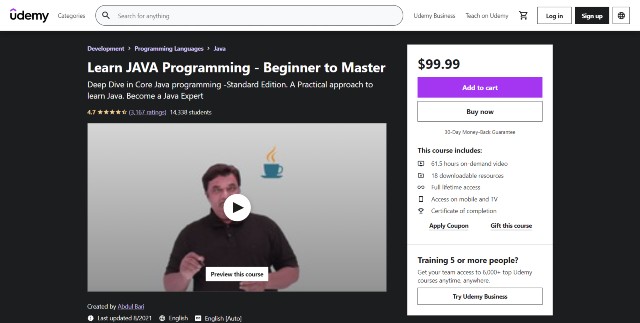
Course Content
Following is a summary of key topics that you will learn in the course.
- Data Types – Variables and Literals
- Java Environment – Setups, Features, Architectures
- Operators and Expressions
- String Objects and Methods
- Conditional Statements, Loops, Arrays
- OOP in Java and relevant concepts
- Packages, Exception handling, Multithreading
- Lambda Expressions
- Java IO Streams & Java Generics
- Collection Framework
- Network Programming
- AWT Abstract Window Toolkit
- JavaSwing & JavaFX
- and many more
The video content of this course is 61.5 hours long. The instructor will thoroughly review all Java concepts and provide numerous real-life examples and demos to help you understand the content better.
You will have an opportunity to use the knowledge you have just learned by completing student challenges and quizzes. There will be 4-5 of them in almost every section, which I believe are sufficient for students to practice effectively.
Reviews: 4.7/5.0, 14300+ students
Pros & Cons
Pros
- Exceptional explanations of all Java concepts
- Well-structured curriculum
- In-depth lessons with tons of real-life examples included
- Adequate quizzes and assignments for students to practice
- Lifetime Access + Updates
- 30-day money-back guarantee
- Inexpensive ($20 or lower when on sale)
Cons
- Abdul’s voice is understandable but somewhat monotonous. Some students struggle to stay awake in some parts of the course.
- No large, real-life projects
3. Java In-Depth: Become a Complete Java Engineer!
This Udemy course by Dheeru Mundluru is a solid option if you are looking for comprehensive Java courses. Beginners will learn Java programming from the very beginning and advance to more complex concepts and applications in one go.
Dheeru is a software engineer with more than 15 years of experience developing software products for companies in silicon valley and elsewhere.
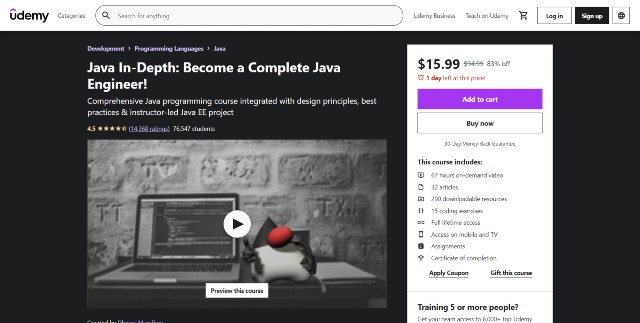
Course Content
Below is a summary of topics that you will learn in the course.
- Java Installation + Writing the first program
- Classes & Objects
- Operators & Control Flow Statements
- Packages & Strings
- Introduction to Eclipse IDE
- Java.lang & Coding Conventions
- OOP concepts: Inheritance, Polymorphism, Abstract Classes, Interfaces
- Debugging & Unit Testing with JUnit
- Deep dive into JVM Internals
- Exception Handling
- Input-Output (I/O)
- Data Structures in Java
- Generics, Nested Classes, Enums
- Concurrency
- Database Implementation
- Functional Style Programming – Lambda & Streams
- Introduction to Java EE
- and many more
This video course is 67 hours long. Most of the course time is dedicated to explaining the concepts in detail. However, unlike most Java courses, this one has several projects for students to complete. For example, you will implement a social bookmarking app.
The instructor will spend time guiding you through each step of the project. Hence, once you complete the course, you will be comfortable building Java programs independently.
Reviews: 4.5/5.0, 76,400+ students
Pros & Cons
Pros
- Comprehensive curriculum
- Detailed explanations of concepts and project-building.
- Informative lessons with tons of valuable demos
- Several real-world projects to complete throughout the course
- Numerous other programming resources are available to download
- Responsive Q&A Forum
- Lifetime Access + Updates
- 30-day money-back guarantee
- Inexpensive ($20 or lower when on sale)
Cons
- Compared to other Java courses, this one is apparently less well-structured. The order of lessons is somewhat confusing.
- Many students believe coding exercises and assignments are inadequate. Some of them also don’t have appropriate solutions.
4. Java for Absolute Beginners
Suppose you are a fast-paced learner or desire to grasp Java core concepts as fast as possible. In that case, I think you may be interested in this concise course on Udemy by Nick H, a self-taught programmer with years of experience in Java programming.
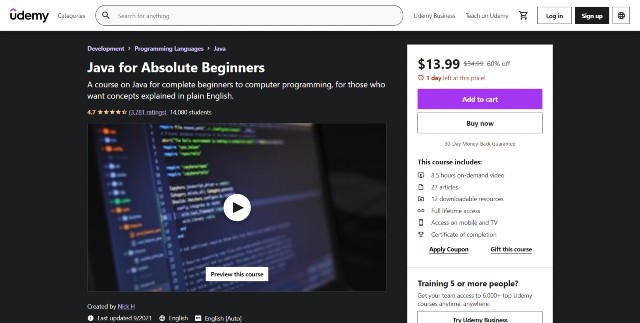
Course Content
Compared to other Java video courses on this list, this one is hugely concise, as it is only 8.5-hour long. Following is the content summary of this course.
- Introduction to Java + Writing the first program
- Variables & User Inputs
- Conditional Statements, Loops, Arrays
- Methods
- Object-Oriented Programming and relevant concepts
Essentially, this course focuses on explaining fundamental Java concepts and nothing else. The explanations are also much less wordy than in other courses.
However, it does not seem to cover advanced concepts such as Lambda Expressions, JVM Internals, or Unit Testing. If you are interested in those, you may need to buy another online course or rely on official documentation.
Regarding assignments, the instructor provides coding exercises and projects for students to put their knowledge to use. However, don’t expect them to be as many as other courses offer.
Despite its name, I think this course may be suitable for those with some Java programming experience since the pace can be too fast for absolute beginners. If you are entirely new to programming, you might be better off taking a more informative Java course.
Reviews: 4.7/5.0, 14,000+ students
Pros & Cons
Pros
- Cover all Java essentials in the most concise manner
- Clear, fast-paced explanations
- Well-structured curriculum
- Lifetime Access + Updates
- 30-day money-back guarantee
- Inexpensive ($20 or lower when on sale)
Cons
- Not a one-stop shop: The course does not cover advanced Java content.
- Most sections of this course have sufficient assignments (with respect to the course length). However, the OOP section has very few exercises.
5. Java Programming and Software Engineering Fundamentals
Suppose you want to learn Java in a more formal, university-like environment. You might want to enroll in this Coursera specialization from Duke University.
You will learn core Java fundamentals and basic software engineering concepts, effectively equipping you with the skills required to become a Java developer.
Important Note: The course page indicates that this program has no prerequisites, but student reviews suggest otherwise. Hence, it would be better if you had some programming experience before enrolling in the program.
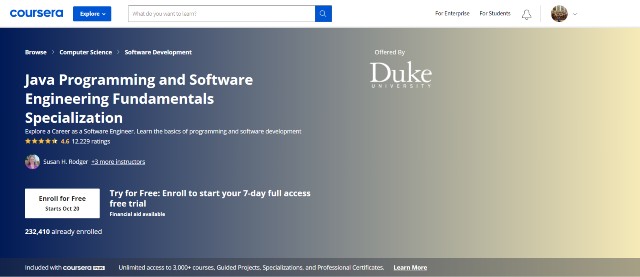
Course Content
This specialization consists of five minor courses as follows:
1. Programming Foundations with JavaScript, HTML, and CSS – Unlike all other Java courses, you will start learning Java by learning other programming languages (HTML, CSS, JavaScript) beforehand.
You may find the approach weird, but it will help you progress to other core Java concepts faster. Furthermore, with this knowledge, you will create interactive web pages, which will be extremely useful when you design and develop an application or a software product.
2. Solving Problems with Software – The second course is where learners will first experience the Java programming language. You will learn how to design algorithms, debug Java programs, write a Java method to solve a particular problem, and finally create classes with multiple methods.
3. Arrays, Lists, and Structured Data – In this course, you will learn data structures and use them with Javas’s object-oriented programming features to build more complex programs.
4. Principles of Software Design – The fourth course will introduce you to software design principles. You will also learn to use Java’s OOP techniques to solve real-world problems and use Java interfaces to create scalable programming solutions.
5. Build a Recommendation System – This minor course is essentially a colossal project. You will use all your Java programming skills to build a recommendation system (similar to Netflix’s that recommends movies to you).
The best thing about this program is that you will work on several projects that will test your skills and help you get sufficient hands-on experience. For instance, you will build a program that determines the popularity of names, an encryption program, a predictive text generator, and many more.
The suggested weekly commitment for this program is 4 hours per week for five months. I think it is perfectly manageable for those with full-time employment.
You can audit the entire program for free. However, if you want to access graded assignments and a digital certificate, you need to pay $49 per month.
Pros & Cons
Pros
- Learn introductory Java programming and software engineering in the same program
- Several real-world projects to complete to get hands-on experience
- Manageable weekly commitment
- Include numerous resources for further study
Cons
- Several absolute beginners find the instructor’s pace too fast.
- The assignments are too challenging for some learners.
6. Introduction to Java Programming
This edX program from Universidad Carlos III de Madrid offers one of the most comprehensive Java training for beginners. You will learn Java basics and understand how to write efficient Java code thoroughly.
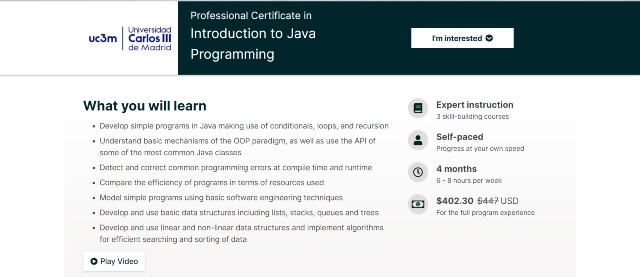
Course Content
This program comprises three minor courses as follows:
1. Starting to Code in Java – The first course will introduce you to Java fundamentals. You will learn about values, expressions, conditionals, loops, recursive algorithms, and many others.
In the second part of the course, you will learn about object-oriented programming (OOP) and relevant concepts such as inheritance. Upon course completion, you will be able to use reusable code to develop Java programs handily.
2. Writing Good Code – The second course focuses on writing correct and efficient Java code. You will learn about debugging processes, unit testing for Java, methods to measure code efficiency based on resource usage, and basic software development principles.
3. Fundamental Data Structures and Algorithms – The final course will drill deep into data structures and algorithms. You will develop and use linear (stacks & queues) and non-linear (trees) data structures. Subsequently, you will implement algorithms for efficient data management.
The program is self-paced. Thus, you can set your schedule. Optimally, you should spend 6-8 hours per week on the program, and you will finish it in four months.
You can audit this course for free. However, I recommend enrolling in the verified track (costing $402) to access graded assignments and exams, which will be extremely helpful if you are new to programming.
Note: this program also has a Spanish version that many Spanish-speaking learners will find more comfortable learning.
Pros & Cons
Pros
- Well-structured curriculum
- Learn from numerous code examples and case studies
- Free auditing
- The Spanish version is available.
- Students can take this course to prepare for the AP Computer Science A Exam
Cons
- Costly compared to other alternatives
7. AP Computer Science A: Java Programming
This course from Purdue University on the edX platform targets high school students preparing for an AP Computer Science A Exam. However, regular learners who want to learn introductory Java can also take it.
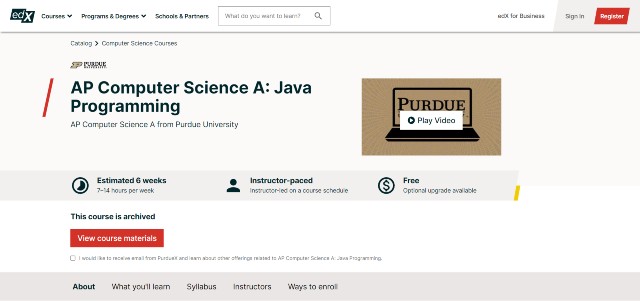
Course Content
Below is a summary of what you will learn in this course.
- Computer Science Fundamentals
- Introduction to Java IDE and Debugger
- Build a Java class and a simple program
- Main Method and I/O in Java
- Data Types & Variables
- Operators, Methods, Classes
- Selection
This course will primarily include concepts that may be on the exam. Undoubtedly, it will not be as comprehensive as other Java courses on this list.
However, I chose to include this course in the list because I think absolute beginners who struggle with core Java syntax may find it beneficial. The teaching pace is not too fast and may help clarify some important concepts.
You should spend 7-14 hours on this course, and you will finish it in 6 weeks. Auditing this course is free of charge. Alternatively, you can pay $49.99 for a verified track to access graded assignments.
Pros & Cons
Pros
- One of the best Java programming courses for AP Computer Science A Exam
- Detailed explanations + Slower pace than other courses, thus optimal for absolute beginners
- Well-structured curriculum
- Affordable verified track
- Free auditing
Cons
- As a test prep course, this course does not provide comprehensive Java training.
8. Introduction to Java Programming (HKUSTx)
This two-course series from the Hong Kong University of Science and Technology (HKUSTx) provides excellent beginner-level training for Java. You will need to enroll in each part separately.
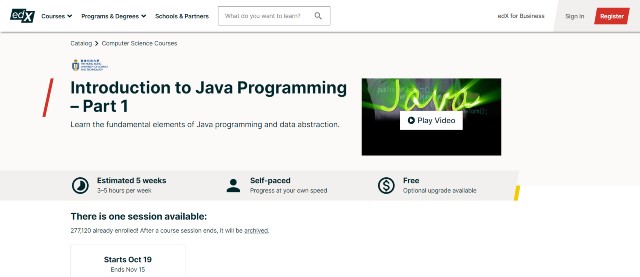
Part I Course Content
You will learn the fundamental elements of Java programming and data abstraction in the first part. Below is a summary of what you will learn in this course.
- Data Types and Arithmetic Expressions
- Object-Oriented Programming Basics
- Branching and Loops
- Arrays
Most students spend approximately five weeks on the course (3-5 hours per week.) Auditing the course is again free, while a verified track costs $99.
Part II Course Content
The second part will drill deeper into more advanced Java concepts, including the following:
- String Manipulation
- File I/O
- Event-driven Programming
- Recursion
- Abstract Data Types
You will learn all essential Java programming concepts from both series. In addition, you will formulate and implement solutions in Java to real-world problems.
The drawback of the series is that it has no huge, real-world projects for students to complete. If you want to get additional hands-on experience, you will need to buy other courses.
The suggested pace and pricing are the same as the former course.
Pros & Cons
Pros
- Learn essential Java topics in detail
- Both courses include photos and images to help illustrate advanced concepts and enhance your understanding.
- Manageable pace
- Free auditing
Cons
- Unlike most other Java online courses, this series has no large, real-world projects for students to complete
Advanced Java Courses
Below are advanced Java courses designed for students with experience in Java or any other programming language. The teaching pace will be much faster, and you will work on more advanced projects.
9. Core Java Specialization
Created by LearnQuest, this Coursera specialization is designed for those with some programming experience to learn Java. Upon program completion, you will have all the skills needed to become a Java programmer.
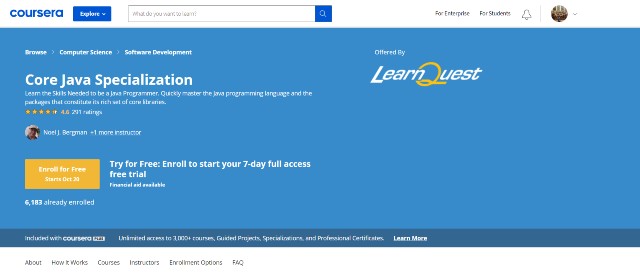
Course Content
This specialization consists of four minor courses as follows:
1. Introduction to Java – The first course will drill deep into the basics. You will learn about data types and control flow (conditionals and loops).
2. Introduction to Object-Oriented Programming with Java – The second course will discuss OOP and relevant concepts. You will learn how to properly create and use classes, objects, and packages.
3. Object-Oriented Hierarchies in Java – In this course, you will learn about OOP relationships, including inheritance, polymorphism, encapsulation, interfaces, and others in detail.
4. Java Class Library – Essentially, the final course will discuss Java generics, Java Collections, Exception Handling, I/O, Enums, and annotations.
You will be comfortable writing reusable code and handling errors upon course completion. Furthermore, you will be fully prepared to learn how to use popular Java frameworks such as Spring.
This program is relatively short compared to other Java courses. LearnQuest suggests spending 4 hours per week on the program; you will complete it in 5 months.
Auditing each course is free, while a complete program costs $49 per month.
Pros & Cons
Pros
- Excellent explanation of concepts
- Straightforward, comprehensive curriculum
- Bite-sized, easy-to-follow lessons
- Free auditing
Cons
- No large-scale projects for students to complete
- A few students pointed out that the narrator’s voice is a bit annoying.
10. Become a Java Web Developer
This Nanodegree program from Udacity is unarguably one of the best programs for those who want to strengthen their Java programming skills to the expert level.
You will learn back-end development with Java and understand how to put forth enterprise-level, production-ready applications.
Note: You should have solid Java programming knowledge before enrolling in the program, as the program will skip all the basics. Also, you should be able to write basic queries in SQL.
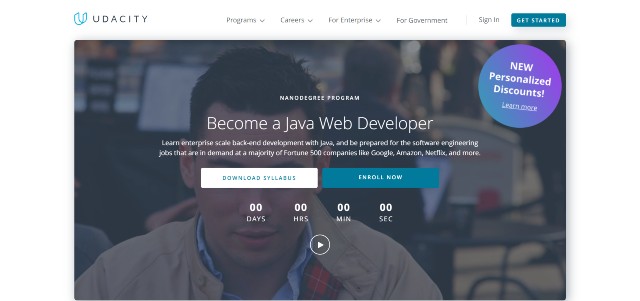
Course Content
This program comprises four sections as follows:
1. Spring Boot Basics – The first section will review the basics of Java programming. Later on, you will learn how to use Spring Boot, Spring MVC, Thymeleaf and understand how to perform testing and secure your data.
2. Web Services and APIs – The second section will explain the difference between web services, APIs, and microservices in detail. Subsequently, you will develop REST and GraphQL APIs and learn to secure, consume, document, and test them appropriately.
3. Data Stores and Persistence – This section will focus on using JPA and SQL to build applications that read and write to relational databases. Also, you will utilize standard design patterns to make the persistence layer testable and integrable with a Spring Boot application.
4. Security and DevOps – You will learn about Git, version control, and best practices for authorization and authentication in the first part of this section. Later on, you will use Jenkins to build a CI/CD pipeline for production.
In each section, you will work on real-world projects and obtain tons of hands-on experience in the process. For instance, you will build a back-end system for a car website, design a data model for a SaaS application, or create a web-based personal storage application.
These are suitable for adding to your Github portfolio to showcase your skills to potential employers and clients.
Udacity recommends spending 5-10 hours per week for four months. However, you can freely set your study schedule since the program is self-paced. Just keep in mind that the more time you spend on the program, the higher the tuition fees (see #pricing below.)
Student Support
Student support is what makes an Udacity program shine. All students can access three types of support as follows:
1. Mentor Support – You can use the chat interface on Student Hub to ask unlimited questions to your mentor 24/7. In most cases, you will receive a reply in less than an hour. Hence, you don’t need to worry that you will get stuck and cannot proceed to more advanced topics, as you are always in good hands.
2. Project Reviews – You can request experts to review your projects. They will provide personalized feedback and insights to improve the code even further.
The best thing here is that you can make unlimited requests, and the turnaround time for each project review is fast (approximately 1-3 hours). Hence, you can get valuable feedback on every step of the project, which can benefit learning Java.
3. Career Services – Like web development bootcamps, Udacity’s team will review your resume, LinkedIn profile, and Github portfolio to ensure that they appropriately showcase your skills and qualifications to potential employers.
Pricing
Udacity uses a subscription-based pricing model. This program costs $399 per month, but if you pay for four months at once, you will receive a 15% discount, lowering monthly fees to $339.
However, Udacity frequently offers discounts and financial support as high as 75% off. It is possible to enroll in this excellent program by paying only $100 per month.
Suppose you are still unsure whether this Nanodegree program is worth an investment. In that case, I recommend downloading a complete program syllabus to view all the topics in each section and see how student support works.
[sc name=”udacity” ][/sc]Pros & Cons
Pros
- Comprehensive curriculum
- In-depth, informative lessons with practical examples
- Numerous assignments and real-world projects to practice and gain hands-on experience
- Udacity frequently updates the program, so most of the course content is up-to-date.
- Timely support from mentors
- Unlimited Project Reviews
- Career services are a big plus.
Cons
- Costlier than most alternatives
- Projects can be highly challenging.
Coursera Plus
This article features several Coursera programs. If you are interested in more than one of those, I highly recommend subscribing to Coursera Plus. With this subscription, you no longer need to pay course fees for any specialization you enroll in.
At $399 per year (or $33.25 per month), Coursera Plus subscription fees are cheaper than the individual course fees ($39-$79 per month). It also grants access to over 3000 courses and specializations on the platform for a year, providing excellent value for money.
[sc name=”coursera” ][/sc]Other Relevant Programming Courses
Kotlin – Designed to interoperate fully with Java, Kotlin is a popular programming language for Android development. Google also makes Kotlin a preferred language for developing Android apps. Hence, once you master Java, you might also want to learn Kotlin.
C++ – C++ is an overwhelmingly popular language for software and game development. If you want to pursue a career in software development, C++ knowledge would be helpful.